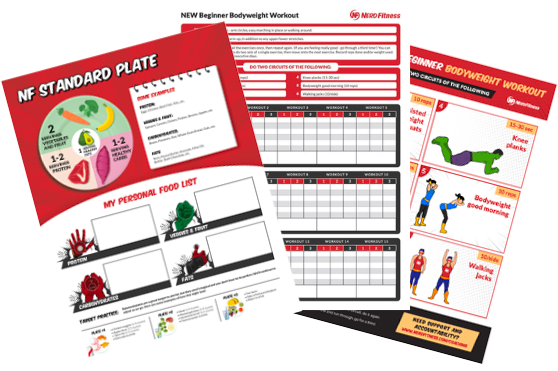
This is an article from NF Rebel Family Correspondent and Mental Health Professional Dan.
A quick note from Steve: Today we’re going to be discussing some issues that may be difficult for some going through a tough time. If you (or someone you know) aren’t coping so well, PLEASE see the links at the bottom of this article with some resources from all around the world.
Obviously, we recommend discussing this information with your health professional – none of this is a diagnosis, but rather a starting point for discussion. Here’s Dan!
Most of us have been impacted by mental health problems.
We’ve been so anxious sometimes that we make up excuses not to see friends, we know our neighbor just stayed in bed for weeks after her divorce, our niece stopped eating for days at a time, our grandfather still lies awake at night thinking about the war, or our friend could barely cope after having her second child.
These are common issues that likely apply to many of us right now. But what’s not so common, is talking about them.
When we don’t talk about things, we all run around with wrong ideas of how things are. Myth and stigmas develop. People may start to feel isolated and ashamed. All because we don’t talk about this stuff! Just like some people don’t like asking for directions when they’re lost, or ashamed to ask for help in the gym if they are struggling with a move, others can be afraid or feel embarrassed that they are having not-great thoughts.
In my work within the mental health sector, I’ve seen the huge benefits people gain by simply talking about their problems, and also, a whole lot of misconceptions people still have.
So today we’re going to bust some myths (without blowing up a cement truck, sorry) surrounding our mental health and make sure we’re all taking care of ourselves!
WHERE’S YOUR HEAD AT?

It’s normal to be concerned with the health of your body – so why are we so weird about talking about the health of our minds?
Good mental health is about being able to live your life in a satisfying way to your full potential. A person who has “good mental health” has good emotional and social well-being, plus the capacity to cope with life’s challenges. But just like injury happens in the body, it can happen in the mind in varying degrees.
If you break an ankle, would you have it seen by a professional as quickly as you could, or would you think: “Ouch! It hurts, but telling someone about this would be way too embarrassing, plus it’ll probably fix itself?”
Now imagine at some point this year, at random, 1 in every 4 people you know breaks their ankle. Your best friend broke their ankle, a few colleagues have their feet elevated at their desks, your nephew asks you to sign his cast, and the Rio Olympics have to be postponed because a quarter of athletes can’t compete.
What would happen?
There’d probably be a worldwide campaign on avoiding ankle injury. Those with broken ankles would get together with those who’d just recovered and discuss strategies on how to manage this period. We’d repost this article on the blog five times, there’d be an ankle specialist on every street corner, and you’d help those close to you however you could, because at this rate, you may be next.
We’d certainly at least all be talking about the ankle epidemic, right?
Then why the hell aren’t we doing the same thing with mental health? In any given year, around 1 in 4 people will have some sort of mental health issue. That may very well be your best friend, your colleagues, your nephew, an Olympian, or maybe you, too.
It’s treatable, common, and people recover from it. But unlike a broken ankle, left untreated, the consequences of mental health problems can be much more devastating.
It doesn’t make you a bad person or broken: it makes you normal if you are dealing with some mental challenges. Just like a healthy person goes to a gym to stay in shape or get in shape, a healthy person should speak with somebody about their mental health to stay mentally healthy or get mentally healthier.
So now that we know a bit more, what do some mental health problems look like?
Mental Health Problems and their causes

“Why do we fall? So that we can learn to pick ourselves up.” -Alfred to Bruce Wayne, Batman Begins
Feeling down, angry, stressed or anxious are all normal human emotions. We all feel sad when a loved one unexpectedly dies, when we miss out on that promotion, or after watching that episode of Futurama.
(Note from Steve: Have you seen the amazing movie, Inside Out? If you haven’t, you should leave work right now and watch it. #TeamBingBong)
Being sad (or anxious, nervous, panicked, angry, confused, distressed, etc.) happens to all of us from time to time (who doesn’t love a good rage-quit?). But it’s when these feelings persist for long periods of time (more than a few weeks) they may be part of a mental health problem.
Mental health problems can influence how you think and your ability to function in your everyday activities. Here are some general signs you can look for:
- Not enjoying, or not wanting to be involved in things that you would normally enjoy
- Becoming easily irritated or having problems with friends and family for no reason
- Feeling sad, ‘down’, or crying for no apparent reason
- Consistently having trouble concentrating or remembering things
- Feeling too nervous and stressed, a lot of the time, or for no good reason
- Having intrusive negative, distressing or unusual thoughts
Two of the most common mental health issues are:
- Anxiety disorders – Super common (affects around 18% of the U.S. population) and also super treatable (usually without any medication), but only a third of those suffering seek help.
- Depression – Not as common as anxiety (affecting around 5%), but also treatable, and comes in many forms. For example, many women experience post-natal depression, experiencing full-blown feelings of extreme sadness after giving birth, making it difficult for these new mothers to complete daily care activities for themselves and/or for their babies. Depression is very serious (it’s not just a fancy expression for feeling “bummed out”) and left ignored or untreated it can have a severe impact on someone’s health, and even put their life at risk. But, those who do seek treatment often see improvements in symptoms in just a few weeks.
The exact cause of mental health problems is not known, but it is becoming clear through research that many of these conditions are caused by a combination of factors, not one single issue.
A number of factors may increase someone’s risk of developing a mental health problem:
- early life experiences (trauma, loss of a loved one)
- biological makeup (a family history of mental health problems)
- individual factors (self-esteem levels, coping skills)
- current life circumstances (work stress, relationship issues, poor nutrition, money problems)
Mental health problems do not discriminate. It doesn’t matter if you’re a DC fan or Marvel fan, a Scout or a Warrior, PC or Console, you too can develop a mental health problem. There’s no embarrassment or shame in having a mental health problem, just like there isn’t when you get injured.
First and foremost, take care of yourself!
Even if you’re not currently experiencing any mental health problems, you too can keep your mind healthy by putting some simple measures into action.
Looking after your mental health

“Take care of yourself, you must.”
Like our physical health, the state of our mental health isn’t fixed. We Rebels love to put time into our learning about and improving physical health. We work on cleaning up our diet, aim to run further, lift more and level up, but when was the last time you put some effort into taking care of your mental health?
Well, you may actually be looking after your mental health without even knowing it. Although everyone should seek help for their own specific situation, there are a number of things we all can do to look after our mental health and wellbeing (Spoiler: Diet and exercise to the rescue once again).
Research shows that coping with stress by getting involved with sports, exercising, meditating, or yoga is highly effective in improving your mental health, and can be even more effective than medication for those currently experiencing a mild to moderate mental health problem.
I understand this is much easier said than done to someone experiencing depression or social anxiety, but setting small, achievable goals (say a 15-minute walk a few times a week) can really help in getting you started, motivated and feeling better.
Surprise, surprise: it’s also been shown that what you eat may also affect your mood. A well-balanced diet will help keep you both physically and mentally healthy. (Win, win, win.)
Sleeping well, challenging yourself, socializing, and expressing yourself through art, writing, or music are also key factors in keeping your mental gear solid. (I can’t believe I made it this far with only one dad joke.)
Getting Help and helping others

Gaining support is so important when it comes to recovering from a mental health issues.
So speak up and seek help when you need it. On a daily basis I see the positive effect this has on so many, and unfortunately, I also see the devastating impact it can have on people and their families when they don’t seek help.
We will all know (or be) someone experiencing mental health issues at some point in our life. If someone you know tells you they’re not OK:
Don’t:
- Tell them to just cheer up or get over it.
- Rush to judgement.
- Encourage them to have a night out involving drugs or alcohol. Substance use may help them cope with their concerns temporarily, but is likely to make things worse in the long run.
- Ignore their issues – you may be the only one they can talk to at the moment.
Do:
- Listen! Listening can be helpful, and even without taking any action, might be just what they need.
- Encourage activities that promote mental health, such as exercise, good eating, regular sleep, and doing things the person enjoys.
- Support and reassure that you will be there for them, and ask what they need from you.
- Provide them with information about where they can get some professional help.
For anyone who may be thinking your problem isn’t that big and may just go away, it’s never too early to speak to someone, be that a friend, family member, GP or mental health professional. I can not stress that enough! Small issues can become extreme issues in a very short period of time under certain circumstances.
When it comes to mental health, there’s no need for this silly stigma anymore — it’s only continuing to harm the people we know and love. I want to live in a world where my kids are just as comfortable discussing their mental health as a broken ankle.
And if anyone can make it happen, I’m damn sure it’s us! This is the Rebellion – for years we’ve been railing against how the mainstream treats health and fitness. We push real solutions that take hard work and dedication over a lifetime.
Help me challenge the conventional wisdom once again. I urge you all to talk openly about your experiences with mental health issues and help out anyone who may be going through a rough patch. By just being a little more aware and supportive to those around you, you may be doing a hell of a lot more than what you think.
Rebels, take care of yourselves, and each other.
-Dan
If you, or someone you know, would like further support, here are some excellent links and services that will get you started in the right direction:
North America – Suicide Prevention Lifeline, List of Mental Health hotlines
Canada – List of Mental Health services
Great Britain & Ireland – Samaritans, List of services via Mental Health Foundation
Australia – National helplines and websites, Lifeline
New Zealand – Mental Health helplines
India – SNEHA
Worldwide – Worldwide mental health hotlines, Worldwide suicide hotlines, Befrienders Worldwide
###


